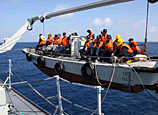
 |
| In Africa, apart from exploiting copper mines and oil, Chinese investors have long been actively involved in promoting local people's well-being. |
The Intangibles
For the past decade, Chinese overseas investment has not only brought tangible benefits to the table, but also the intangible ones.
One that is under the radar is that Chinese companies investing in overseas businesses may help them tap the vast Chinese market.
Fosun International, a major private Chinese investment group, acquired a 7.1 percent (later raised to 9.3%) equity stake in the French luxury resort operator Club Med in June 2010, and bought 9.5 percent of the Greek luxury brand Folli Follie Group in May 2011. Fosun subsequently used its own resources and expertise to help both brands strengthen their presence in the Chinese market. Club Med's first Chinese resort followed six months after Fosun partnered with the French leisure company.
This practice of working in partnership with some foreign businesses has been shared by many other Chinese companies, which acquire minority stakes in overseas corporations.
"Many foreign businesses would like Chinese investors to acquire minority interests in their operations, because it will help them enter the Chinese market more easily," Dr. Cui with the CUFE told this journalist.
"The commonly mentioned benefits that Chinese overseas companies brought to the host nations are their investments in the local people's livelihood."
Chinese overseas businesses have been actively involved in promoting such social benefits as investing in local infrastructure, exporting technologies and training services as well as carrying out charitable activities, among others.
In Africa, apart from exploiting copper mines and oil, Chinese enterprises also made investment in the construction of processing plants and refineries. They improved local labor force's skills through technical training; they built hospitals and schools, paved roads and dig wells; they donated money to carry out the "Brightness Action" activities, helping more than 1,000 local cataract patients have their sight recovered, according to various media reports.
Furthermore, China continually sends such skilled staff as seafarers, medical care personnel, teachers and engineers to work in Africa.
"To the best of my knowledge, most Chinese companies operating overseas have been well aware of their corporate social responsibilities (CSR), and indeed did a lot of work on improving local people's livelihood," Dr. Cui said.
















 Residential building collapses in E China's Ningbo
Residential building collapses in E China's Ningbo


![]()
